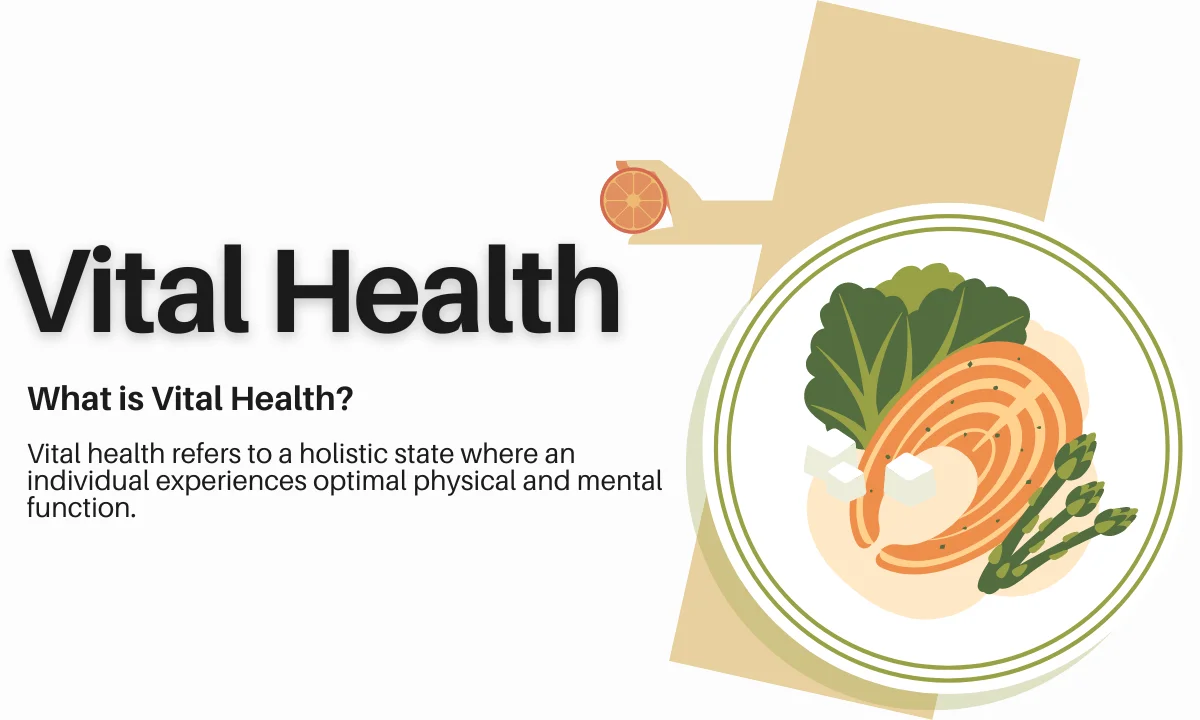Vital Health: A Comprehensive Guide

Vital health is more than just the absence of disease; it encompasses a state of complete physical, mental, and social well-being. In today’s fast-paced world, maintaining vital health is crucial for leading a fulfilling and productive life. This article explores the various aspects of vital health, offering insights into how you can achieve and maintain it.
What is Vital Health?
Vital health refers to a holistic state where an individual experiences optimal physical and mental function. It’s about having the energy to live life to the fullest, managing stress effectively, and preventing diseases through proactive measures. Vital health is the foundation of a vibrant life, allowing you to engage in activities, maintain relationships, and achieve personal and professional goals.
Physical Health
Physical health is a key component of vital health. It involves maintaining a healthy body through proper nutrition, regular exercise, and sufficient rest. Eating a balanced diet rich in fruits, vegetables, lean proteins, and whole grains provides the necessary nutrients for the body to function optimally. Regular physical activity strengthens muscles, improves cardiovascular health, and enhances flexibility and balance.
Adequate sleep is also essential for physical health. It allows the body to repair and regenerate, supporting cognitive function and emotional well-being. Adults should aim for 7-9 hours of sleep per night to maintain optimal health.

Mental Health
Mental health is an integral part of vital health. It encompasses emotional, psychological, and social well-being. Good mental health enables you to cope with the normal stresses of life, work productively, and contribute to your community. Strategies for maintaining mental health include:
- Practicing mindfulness and meditation to reduce stress
- Seeking therapy or counseling when needed
- Engaging in activities that bring joy and fulfillment
- Building strong social connections and support networks
Managing stress is crucial for mental health. Chronic stress can lead to mental health issues such as anxiety and depression, impacting overall well-being.
Preventive Care
Preventive care is a cornerstone of vital health. It involves regular health check-ups, vaccinations, and screenings to detect and prevent potential health issues. Early detection of diseases can lead to more effective treatment and better outcomes. Preventive care includes:
- Regular physical exams
- Blood pressure and cholesterol screenings
- Cancer screenings (e.g., mammograms, colonoscopies)
- Vaccinations (e.g., flu shots, COVID-19 vaccines)
By staying proactive about your health, you can catch potential problems early and take steps to address them.
Healthy Lifestyle Choices
Adopting healthy lifestyle choices is essential for maintaining vital health. This includes:
- Eating a balanced diet
- Staying hydrated by drinking plenty of water
- Engaging in regular physical activity
- Avoiding harmful habits such as smoking and excessive alcohol consumption
A healthy lifestyle supports overall well-being and reduces the risk of chronic diseases such as diabetes, heart disease, and obesity.
Holistic Approach to Vital Health
Vital health involves a holistic approach that considers the interconnectedness of physical, mental, and emotional health. It’s about nurturing all aspects of your well-being to achieve a balanced and fulfilling life. This approach includes:
- Practicing self-care and self-compassion
- Setting realistic goals and expectations
- Maintaining a positive outlook and attitude
- Seeking balance in work, relationships, and personal pursuits
A holistic approach recognizes that all aspects of health are interrelated and contribute to overall well-being.
Vital Health in Everyday Life
Incorporating vital health into your daily routine can lead to significant improvements in your quality of life. Here are some practical tips:
- Morning Routine: Start your day with a healthy breakfast and some light exercise. Morning stretches or yoga can improve flexibility and set a positive tone for the day.
- Work-Life Balance: Make time for breaks throughout your workday. Step away from your desk, take a walk, or practice deep breathing exercises to reduce stress.
- Evening Routine: Wind down with relaxing activities such as reading, meditating, or spending time with loved ones. Ensure you have a consistent sleep schedule to promote restful sleep.
Key Components of Vital Health
| Aspect | Importance | Examples |
|---|---|---|
| Physical Health | Foundation for overall well-being | Nutrition, exercise, sleep |
| Mental Health | Enables coping with stress and challenges | Mindfulness, therapy, social support |
| Preventive Care | Early detection and prevention of diseases | Regular check-ups, screenings |
| Healthy Lifestyle | Reduces risk of chronic diseases | Balanced diet, hydration, no smoking |
| Holistic Approach | Balances all aspects of health | Self-care, goal-setting, positivity |
How to Maintain Vital Health (Tips)
Maintaining vital health involves a balanced approach to physical, mental, and emotional well-being. Here are some effective tips:
1. Eat a Balanced Diet: Incorporate a variety of fruits, vegetables, lean proteins, and whole grains into your meals. This ensures your body gets essential nutrients.
2. Stay Hydrated: Drink plenty of water throughout the day. Hydration is key to maintaining bodily functions and overall health.
3. Exercise Regularly: Engage in at least 30 minutes of physical activity daily. This can include walking, running, yoga, or any form of exercise that you enjoy.
4. Get Adequate Sleep: Aim for 7-9 hours of sleep each night. Quality sleep is essential for body repair and mental clarity.
5. Manage Stress: Practice mindfulness, meditation, or deep-breathing exercises to reduce stress levels. Stress management is crucial for mental health.
6. Regular Check-ups: Visit your healthcare provider regularly for check-ups and screenings. Preventive care can detect potential health issues early.
7. Avoid Harmful Habits: Avoid smoking and limit alcohol consumption. These habits can negatively impact your overall health.
8. Build Strong Relationships: Maintain a supportive social network. Positive relationships can enhance your emotional well-being.
Location and Working Hours of Vital Health
Vital Health International is based in Cheyenne, Wyoming, USA. The company operates from:
- Monday to Friday: 7:00 a.m. to 6:00 p.m. Pacific Time
- Saturday: 9:00 a.m. to 1:00 p.m. Pacific Time
For more details or to contact them, you can visit their website.
Frequently Asked Questions
What is Vital Health?
Vital health refers to a holistic state of well-being, encompassing physical, mental, and emotional health. It is about having the energy and capability to live life to the fullest.
How can I improve my vital health?
Improving vital health involves a balanced diet, regular exercise, adequate sleep, stress management, regular medical check-ups, and avoiding harmful habits.
What services does Vital Health International offer?
Vital Health International offers various health-related products and services. They provide educational resources, customer success stories, and detailed policies on privacy, shipping, refunds, and terms and conditions.
Why is preventive care important for vital health?
Preventive care helps detect and prevent potential health issues early. Regular check-ups, screenings, and vaccinations can lead to more effective treatments and better health outcomes.
Top 5 Best Foods for Vital Health
Eating the right foods is crucial for maintaining vital health. Here are the top 5 best foods:
| Food | Benefits |
|---|---|
| Blueberries | High in antioxidants, supports brain health |
| Spinach | Rich in vitamins and minerals, boosts immunity |
| Salmon | Excellent source of omega-3 fatty acids, supports heart health |
| Almonds | Packed with healthy fats, proteins, and fiber |
| Quinoa | High in protein and fiber, helps with digestion and energy |
Incorporating these foods into your diet can significantly contribute to your overall well-being. They provide essential nutrients that support various bodily functions and promote health.
Conclusion
Achieving and maintaining vital health is a lifelong journey that requires commitment and proactive measures. By focusing on physical health, mental well-being, preventive care, and healthy lifestyle choices, you can enhance your overall quality of life. Remember, vital health is not just about living longer; it’s about living better, with energy, joy, and fulfillment. Prioritize your health today and embrace the holistic approach to achieving vital health.






